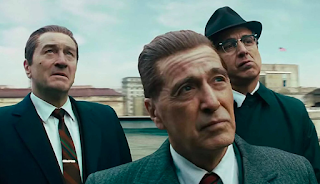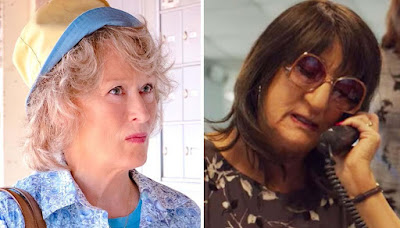
You will likely hear a lot about the length of the new Oscar-baity Martin Scorsese movie
The Irishman (a.k.a. I Heard You Paint Houses) Modern audiences, especially those used to half watching movies at home may be overwhelmed by it.
But if you appreciate Scorsese, the gangster genre and the talents of legends like Robert De Niro, Al Pacino and Joe Pesci, you won't only be pleased you might have a profound experience.
This is a movie about death. It's about Martin Scorsese reckoning with the legacy he's left behind of violent entertainment like
GoodFellas. Yes, it's long -- but I never found it boring and it delivers so much content to feast on I wouldn't have dreamed of complaining.
Us may be my favorite movie to watch this year,
Once Upon a Time in Hollywood may be Tarantino's best (therefore a classic in its own right) and
Parasite might be the best film from a craftsmanship perspective, but for me,
The Irishman is the best film I've seen this year.
Not unlike Clint Eastwood's work in
Unforgiven, Scorsese is intentionally deconstructing the genre he, perhaps more than any other director, helped shape. It's violent deaths are less glamorous and more horrifying. We see the fallout of the killings in a way we never did in previous Scorsese epics.

There's a great running gag throughout the film where Scorsese lets you know how several different characters will eventually die in ironically blunt titles that appear on-screen. You get a sense that all these people, including the irascible Jimmy Hoffa (played with great vigor by Pacino), may not have deserved to die they way they do, even the worst of them.
That regret is etched on De Niro's face throughout -- whether it's a remarkably youthful looking De Niro (thanks to fantastic digital effects) or an aging, pathos-inspiring De Niro who peppers the film with deadpan funny narration throughout. This is a stunning reminder that De Niro once was and could still be our greatest living actor. He delivers a tour de force here as a man who is terrible at expressing himself except for when perpetrating violence on others.
He is not a particularly vicious person -- the one temper tantrum he has is almost justified (it's directed a shopkeeper who has shoved his daughter). He's just a foot soldier, someone willing to do dirty work at the behest of others like Hoffa and a smooth mob boss played beautifully by an understated Joe Pesci.
He is a brutally effective killer but what happens to a man who makes that his life's work. Are the people he killed luckier than he is because he's the one who has to live with the collateral damage.
For me, someone who is preoccupied with aging and who fears their inevitable death, watching The Irishman was a sad and moving experience for me. There's a feeling that we'll never see these actors shine so bright again, never see Scorsese this engaged and personal.
These are actors and filmmaker who are infamous for their youthful energy. All these men are well into their 70s and yet have maintained a sort of intimidating macho cool. So to see them play these more vulnerable notes is astonishing. Had these actors (and Harvey Keitel, who has a smaller role here) been played by less iconic stars, this film might not have the same cache, but because it does, the movie earns its running time and then some. It's a movie to revisit to analyze and revel in.
And yet again I must declare this the best year for film in recent memory. It's telling that
The Irishman (and other awards contenders like
Marriage Story) will probably be viewed on streaming services far more than on actual screens. Movies like this may never have a home in actual cinemas ever again.
So the film works that way to -- as an elegy for grounded, character-driven drama (albeit a bit too male dominated for a lot of peoples' tastes -- the underwritten women is the movie's single biggest flaw). By in large audiences seem to have lost patience with anything that isn't at least linked to an existing property. And while
Joker was able to have its cake and eat it too in that regard -- there's just a much bigger market for movies dead aimed at fanboys rather than discerning adults.
It's easy to get all 'get off my lawn' defensive about
The Irishman -- it's a labor of love for people who love these kinds of movies. Consider me smitten.



















